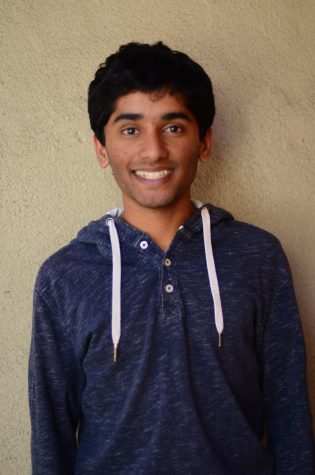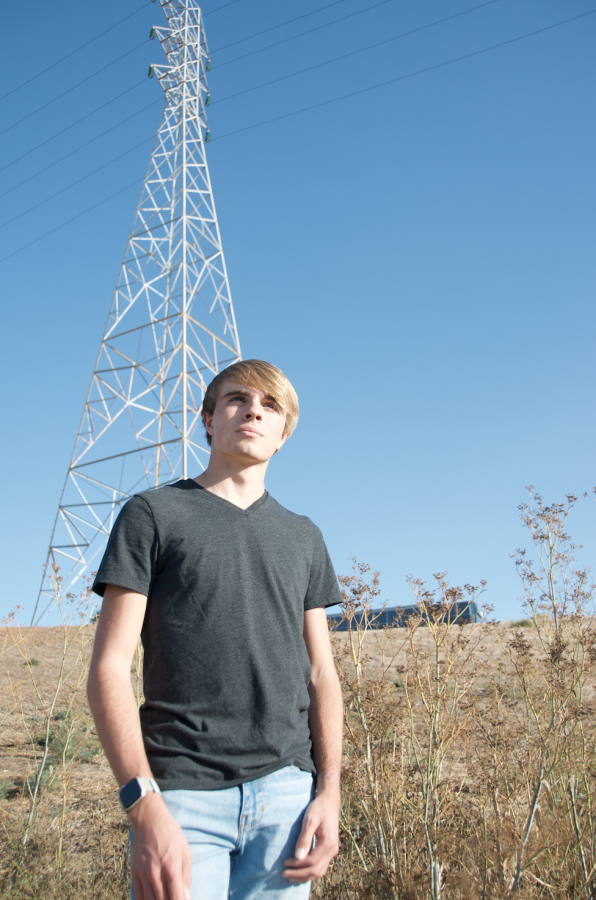Humans of Harker: Compassion in curiosity
Finn Frankis (12) guides his team through kindness and intent
“I want to be the best person I can to people in terms of compassion and kindness. I’m not sure where it really comes from — I guess my identity, ever since I moved here, has been ‘the Canadian,’ so there’s always that stereotype where I have to be super nice to everyone and I have to apologize for everything. But it really does hurt me if I make someone feel bad. I’d much rather them be more positive or happy because of something I’ve done,” Finn Frankis (12) said.
Students begin to pour into Nichols 312 and 314 as office hours ends at around 3:40 p.m., creating a buzz of action and energy throughout the rooms in anticipation of the upcoming weekly robotics meeting. The fervor soon dies down and all eyes look up as Finn Frankis (12) calmly strolls up to the front in a plain gray v-neck and light blue jeans. Smiles break out across the crowd, from the nervous newcomers to the relaxed upperclassmen, in response to the wide grin on Finn’s face as he begins this Thursday’s robotics training meeting with a cheery “Hey, everyone!”
As the executive president of the Harker Robotics Team, Finn oversees the team’s various divisions and guides them towards the team’s vision. His journey to his current position began three years ago, when he was not the seasoned veteran standing in front of the room but the eager freshman ready to get started.
Even in his first year, Finn’s enthusiasm for robotics was palpable: in fact, as upper school computer science department chair and robotics team advisor Dr. Eric Nelson recalls, his presence was quite noticeable in the team records.
“[I was] looking at logs and rosters and trips and permission forms, and I found out that in his freshman year, [Finn] went to every single solitary robotics event that required a permission form,” Dr. Nelson said. “I didn’t even manage that that year, so he outdid me in terms of going to everything robotics did, and he’s been doing that ever since.”
Finn has been a part of the electrical and software subteams in the past, often applying his skills and effort into filling any gaps or helping out wherever needed to make the biggest impact on the team. Now, though he laments “being out of the action” a little, Finn appreciates the ability to implement some of his ideas and vision in his administrative role.
“We’re trying to figure out how to do as well as possible without sacrificing giving the most people possible the experience of learning robotics, so trying to find that careful balance between striving to win but also to teach,” Finn said. “I kind of believe in, to some extent, motivating ourselves by that win, but for example, if we lose or do poorly, not letting that get us down.”
Setting up milestones for the team reflects Finn’s own tendency to set concrete goals for himself, which he has found to be an effective strategy to complete tasks and responsibilities.
“Personally I’m very goal-oriented; that’s sort of the overall outlook I would use to describe myself. I certainly do strive, when I can define concrete goals in something I’m working on, whether it’s homework or more complex things like a personal project that I’m trying to achieve,” Finn said.
Hari Bhimaraju (11), the operational president for the robotics team, has worked with Finn closely this year as a part of robotics and noted Finn’s humorous nature as an important, if surprising, quality.
“He’s hilarious, and I think that [most] don’t necessarily associate that with Finn. He’s really, really funny, and I think it’s not intentional, which makes it even funnier,” Hari said. “He’ll be very honest in a situation or use a very descriptive word for how he’s feeling … and I feel like just his openness and descriptiveness [make him] funnier.”
Along with the many thrills of teamwork in robotics, Finn’s passion for physics and computer science was one of the main reasons for his interest in the activity. Outside of robotics, Finn’s academic interests have motivated him to take advanced computer science courses and take on the role of a problem leader on the upper school United States Association of Young Physicist’s Tournament (USAYPT) team.
“My favorite thing is having a problem, and then working out a solution on paper, and then coding up an algorithm to try and solve it potentially,” Finn said.
Simar Bajaj (12), a close friend who met Finn in their Study of Theater Arts class in freshman year, noted the effort Finn pours into all of his academic endeavors.
“While his main passion might be in robotics, he takes his love and his passion and puts his 100% into everything, and that’s what makes him distinctive,” Simar said.
Dr. Nelson, who has also taught Finn in two ATCS courses as well as AP Physics C this year, similarly emphasized Finn’s ability to produce “absolutely phenomenal work” based on his own initiative. Nevertheless, the story that stands out most to him was not one of the routine instances where Finn surpassed every expectation academically but instead what he did during the announcement of alliance selections at the end of the Capital City Classic robotics competition in October.
“Finn lost his voice, and you do your selections by going down in the field by announcing them to a crowd of hundreds of people, so Finn handed that over to somebody else. Somebody else got the spotlight, and he didn’t hesitate at all,” Dr. Nelson said. “I don’t know of too many other people who would be willing to give up that public position of ‘This is my team, and I’m in charge, and I don’t care if all I can do is croak out a whisper, I’m going to do it.’”
Even outside of academics, Finn has found another passion in running in the great outdoors, along with other modes of staying active including casual boxing, which he has found to be a meditative experience that helps him reflect and introspect.
“What running means to me [is] an escape from my STEM-and-CS-driven life to clear my mind to a more primal state,” Finn said. “I run to put into perspective my stresses and keep my mind clear for uninterrupted thinking and brainstorming.”
Finn’s compassion, infused with the enthusiasm he brings to everything he does, is what Simar recalls as being the primary factor that led to the development of their friendship in their theater class.
“He put his heart on the line for that class and did everything to the fullest extent. I think there’s something that I was just drawn to with Finn, because he’s just so genuine and so wholesome,” Simar said. “You see him, you smile. He’s one of the few people that is just unequivocally good.”
Some might attribute his natural focus on kindness, as Finn supposed with a chuckle, to his time in Canada, where he lived from the age of two until moving to California just days before his freshman year began. But at the end of the day, it comes down to how Finn wants to impact the people in his life.
“I want to be the best person I can to people in terms of compassion and kindness. I’m not sure where it really comes from — I guess my identity, ever since I moved here, has been ‘the Canadian,’ so there’s always that stereotype where I have to be super nice to everyone and I have to apologize for everything,” Finn said. “But it really does hurt me if I make someone feel bad. I’d much rather them be more positive or happy because of something I’ve done.”

Arya Maheshwari (12) is the co-editor-in-chief of the Winged Post. This is his fourth year on staff, and he's looking forward to developing his writing...


















![“[Building nerf blasters] became this outlet of creativity for me that hasn't been matched by anything else. The process [of] making a build complete to your desire is such a painstakingly difficult process, but I've had to learn from [the skills needed from] soldering to proper painting. There's so many different options for everything, if you think about it, it exists. The best part is [that] if it doesn't exist, you can build it yourself," Ishaan Parate said.](https://harkeraquila.com/wp-content/uploads/2022/08/DSC_8149-900x604.jpg)




![“When I came into high school, I was ready to be a follower. But DECA was a game changer for me. It helped me overcome my fear of public speaking, and it's played such a major role in who I've become today. To be able to successfully lead a chapter of 150 students, an officer team and be one of the upperclassmen I once really admired is something I'm [really] proud of,” Anvitha Tummala ('21) said.](https://harkeraquila.com/wp-content/uploads/2021/07/Screen-Shot-2021-07-25-at-9.50.05-AM-900x594.png)







![“I think getting up in the morning and having a sense of purpose [is exciting]. I think without a certain amount of drive, life is kind of obsolete and mundane, and I think having that every single day is what makes each day unique and kind of makes life exciting,” Neymika Jain (12) said.](https://harkeraquila.com/wp-content/uploads/2017/06/Screen-Shot-2017-06-03-at-4.54.16-PM.png)








![“My slogan is ‘slow feet, don’t eat, and I’m hungry.’ You need to run fast to get where you are–you aren't going to get those championships if you aren't fast,” Angel Cervantes (12) said. “I want to do well in school on my tests and in track and win championships for my team. I live by that, [and] I can do that anywhere: in the classroom or on the field.”](https://harkeraquila.com/wp-content/uploads/2018/06/DSC5146-900x601.jpg)
![“[Volleyball has] taught me how to fall correctly, and another thing it taught is that you don’t have to be the best at something to be good at it. If you just hit the ball in a smart way, then it still scores points and you’re good at it. You could be a background player and still make a much bigger impact on the team than you would think,” Anya Gert (’20) said.](https://harkeraquila.com/wp-content/uploads/2020/06/AnnaGert_JinTuan_HoHPhotoEdited-600x900.jpeg)

![“I'm not nearly there yet, but [my confidence has] definitely been getting better since I was pretty shy and timid coming into Harker my freshman year. I know that there's a lot of people that are really confident in what they do, and I really admire them. Everyone's so driven and that has really pushed me to kind of try to find my own place in high school and be more confident,” Alyssa Huang (’20) said.](https://harkeraquila.com/wp-content/uploads/2020/06/AlyssaHuang_EmilyChen_HoHPhoto-900x749.jpeg)



